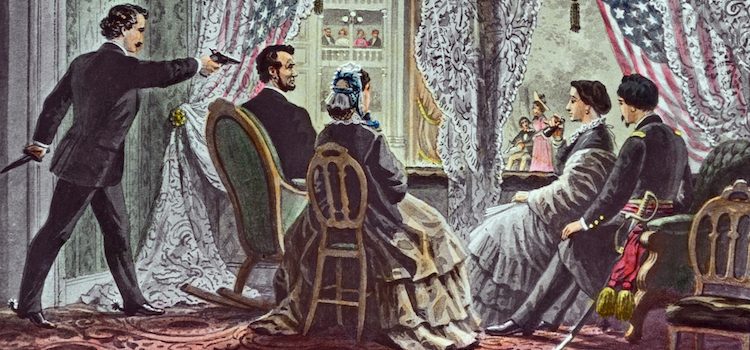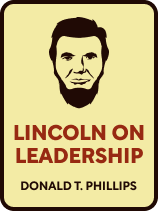

This article is an excerpt from the Shortform book guide to "Lincoln on Leadership" by Donald T. Phillips. Shortform has the world's best summaries and analyses of books you should be reading.
Like this article? Sign up for a free trial here.
What was Abraham Lincoln like as a person? What character traits distinguished Lincoln from his rivals?
Abraham Lincoln is well-known for his big heart and ethical conduct—the qualities that stood him apart from his political rivals. He was even dubbed “Honest Abe” for his unyielding commitment to always telling the truth.
Donald Phillips highlights two major lessons modern-day leaders can draw from Abraham Lincoln’s philosophy and ethics.
Lesson #1: Stick to Your Values
Phillips argues that standing by your moral values is necessary for being a leader. Your values will come to define the values of your organization as a whole, claims Phillips—if you lie and cheat, then your employees will feel comfortable doing the same. If you’re honest and fair, your employees will want to follow your example. An honest and ethical organization is a better organization, says Phillips—it improves morale, makes your employees want to work harder, and helps them communicate openly.
(Shortform note: To recognize the current values of your company, John C. Maxwell (21 Irrefutable Laws of Leadership) explains that you should pay attention to the information that people share with you. If people feel comfortable sharing bad news or criticism with you, that means you’re cultivating personal and company values that support trust, honesty, and openness. However, if you rarely or never hear critiques and bad news, then chances are your employees aren’t comfortable being truthful—Maxwell suggests that this often means they see you as untrustworthy. If you recognize that your company values dishonesty, then you should first examine your own conduct and see how you can act more honestly.)
A major part of Abraham Lincoln’s philosophy, writes Phillips, is his moral code, particularly when it comes to telling the truth. In both his personal and professional lives, “Honest Abe” (as he was known) didn’t make exceptions to what he thought was right. He also tried to encourage similarly honest values among his employees. Sometimes this meant gentle guidance or persuasion, and sometimes it meant demoting or firing people who didn’t share his values. Because of this, Lincoln didn’t just passively preach his values—he actively fought for them.
(Shortform note: Some historians argue that “Honest Abe’s” moral conduct was more of a myth than a historical reality. They suggest that the image of Lincoln as a kindly, just, and truthful politician was in part created by the people around him (especially after his death). These historians explain that while Lincoln was in many cases an ethical man and politician, people shouldn’t take that to mean he never lied or never went against his moral beliefs. These things did happen—for instance, early in his political career, Lincoln once wrote anonymous letters making vicious personal attacks against a political rival.)
Lesson #2: Keep Your Emotions in Check
While values should be a major part of your decision-making, Phillips argues that your ego should not. In particular, he says that you should never lose control of your emotions or become petty and spiteful. If you act on these emotions, you’re more concerned with your self-image or gratification than with what’s best for your organization—a clear example of unethical leadership. In addition, acting on ego or negative emotions discourages your employees from being open and honest with you—for instance, if you blow up at criticism, they’ll be less likely to offer differing viewpoints. However, if you’re understanding and don’t take things personally, your employees will feel more comfortable being open with you.
(Shortform note: Some management and leadership experts argue that emotions should be a major part of your decision-making process. They argue that while negative emotions like pettiness or personal pride won’t help you make good decisions, you still have to acknowledge when these (and other) emotions arise in your organization. Experts suggest that the ability to read and understand emotion is a crucial part of communication—and is, therefore, a crucial part of being a leader.)
Likewise, during his political career, Lincoln was able to keep his ego in check despite a constant deluge of (frequently unfair) criticism from his political rivals and the press. Often this simply meant ignoring the criticism, though he’d occasionally respond to serious attacks questioning his values or moral standing. Instead of letting his emotions control him, Lincoln was compassionate and considerate of the viewpoints of others—he famously pardoned many deserting Union soldiers and even ex-Confederates during the Civil War. When Lincoln felt strong emotions, he’d look for private ways to let them out, like writing angry letters he never sent or speaking to a close confidant.
| Lincoln on Amnesty While Phillips notes that the decision to pardon most Confederates after the Civil War was Lincoln’s intent, John Wilkes Booth assassinated the president before he could put many of his postwar plans into action. Lincoln’s successor in office, Andrew Johnson, mainly handled the pardoning of ex-Confederates, and it was a remarkably controversial and difficult process. Some argue that widespread amnesty was a necessary part of reuniting the country, while others believe that Confederate leaders “got away with” their treasonous acts. Notably, while in 1863 Lincoln had a list of Confederate leaders he wanted to imprison for treason (including famous Confederates like Robert E. Lee and Jefferson Davis), many former Confederates went unpunished and actually rejoined the American government after the end of the Civil War. Some historians argue that this contributed to the “Lost Cause” narrative of the Confederacy that portrayed men like Lee and Davis not as traitors fighting for slavery (a commonly accepted belief in the North during the Civil War) but rather as heroic patriots who fought for state’s rights—a narrative that still exists today. |

———End of Preview———
Like what you just read? Read the rest of the world's best book summary and analysis of Donald T. Phillips's "Lincoln on Leadership" at Shortform.
Here's what you'll find in our full Lincoln on Leadership summary:
- A look at what Abraham Lincoln did and how he did it
- Leadership lessons you can learn from Lincoln
- Why you should consult together and decide alone






